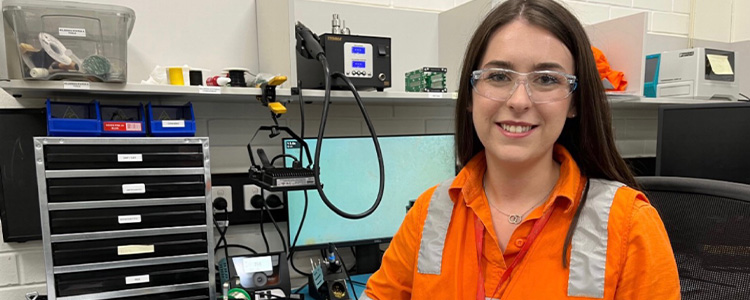Lauren spoke to us about her passion for diversity in engineering and the importance of having a professional network.
Can you tell us a bit about what inspired you to study engineering?
Maths was my favourite subject at high school so I wanted to pursue further learning and a career that could utilise that passion. My older cousin is an electrician with a power utility company, and it piqued my interest when he suggested that engineering would be a good career path for me.
I did some research and discovered that engineering revolutionised the world, and we rely on it for everyday life. This includes modern infrastructure, power generation, clean water, reliable public transport, communication devices and medical equipment. I have always enjoyed problem solving and decided to study engineering to solve problems, which will have real-world outcomes.
What are some of your career highlights to-date?
I created a maintenance strategy for over 350 kilometres of wastewater pipeline and associated instruments, utilising failure data, maintenance history and new technology.
I also spent four months on site commissioning a large-scale heavy industries project, which was on time and on budget. On a personal note, I enjoyed getting out my comfort zone and making the most of growth opportunities.
I led an activity where high school students at the Queensland University of Technology’s Power of Engineering event identified hazards in a photo and suitable hazard control measures. Through this presentation, I aimed to encourage more women to choose careers in science, technology, engineering and maths in time for their senior subject selection.
Can you tell us more about your passion for diversity in the engineering profession?
Diverse and inclusive environments foster collaboration, where everyone is respected and can be their authentic self. I believe that diverse backgrounds, culture, ways of thinking, skills, experiences, and knowledge lead to diversity of thought, innovation, and creativity. A diverse workforce is reflective of the communities we serve as engineers and can allow us to create better knowledge-based solutions.
Neurodiverse teams are important to foster different ways of thinking, leading to high-quality outcomes. To maximise the talent pool in engineering, we must be inclusive and embrace different learning, communication and socialisation styles.
How did you find having a mentor and what did you learn from them?
It has been a great experience to meet someone who has walked a similar life path and to understand his mindset and daily habits. My mentor, Matthew Vocale, is an accomplished engineer and executive at 5B, a clean technology innovation powerhouse that accelerates access to low-cost, safely deployed, gigawatt-scale solar energy. He has taught me about growth mindset, the importance of embracing challenges as opportunities, and that attitude is an important factor in life success.
He helped me gain self-awareness and identify my purpose in engineering by exploring my values, motivations, and vision for the future, and he also explained the process of becoming a Chartered engineer.
What advice would you give to engineering graduates who may be in a similar position to yourself?
Be curious, seek out opportunities to get out of the comfort zone and learn new things. Accept any opportunities for training or personal development. A good attitude goes a long way and most technical skills can be learned.
Join a mentoring program or find an informal mentor at work to learn from their success. A great mentor can help you progress your career by giving honest advice and supporting your growth.

